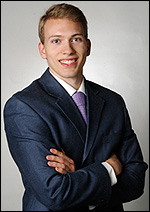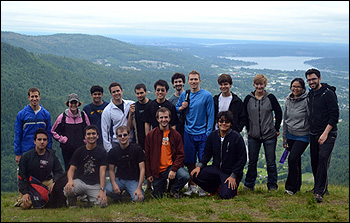The number of graduating college seniors who get lucrative offers to work for Microsoft and turn them down has to be small, but Curtis Northcutt is part of that select group.

The Vanderbilt senior has decided to take his computer science degree to the Massachusetts Institute of Technology in the fall and follow a path toward academia instead of industry.
Northcutt, who will receive the Founder’s Medal for ‘first honors’ in the School of Engineering at Vanderbilt’s Commencement ceremony Friday, has held undergraduate research positions at NASA, General Electric and the universities of Notre Dame and Kentucky. He plans to earn a Ph.D. in computer science and hopes to develop theoretical, mathematical and algorithmic approaches to computer science and teach as a university professor.
Selected by the Vanderbilt School of Engineering for the James Geddes Memorial Scholarship, Northcutt also was a 2012 Goldwater Scholar and holds the distinction of being a Kentucky Colonel – the highest civilian honor awarded by his home state.
While his portfolio is impressive, Northcutt’s love for learning is equally so.
Growing up very modestly in Kentucky, Northcutt found he loved school despite the hours-long bus trips that stretched his days from early morning until almost dusk. He became a voracious reader, excelled in his schoolwork, and learned a key lesson at an early age.
“I became aware of two things,” he said. “Money had absolutely no value to me. What was valuable to me was learning.”

That pairing was evident in the summer of 2012 when Northcutt had a successful internship with Microsoft in Washington state – managing a project team to find a unique new technology feature for Windows phone cameras – and turned down a lucrative job offer from the company.
“I get asked all the time how I could turn the job down. At the end of the day, I could work for Microsoft and help a large corporation make money or I could go and get my Ph.D. and work toward building a foundation in the field of computer science and help improve education through computer science,” Northcutt said. “I see more opportunities in the long run if I get my Ph.D.”
Northcutt was aware that the internship might lead to a job offer, but that did not excite him. What did was the work Microsoft had him do – manage a team of students on a very challenging project, using skills he attained at Vanderbilt, coming up with a useful and unique phone camera application. It is hoped that the app will be released soon.
“It was clear that you can’t make crappy apps for Microsoft,” Northcutt said. “Suddenly, the work became something I could own. I realized I was doing something substantial. The team had to come up with a novel idea, distribute code for it, demonstrate and fulfill all the criteria they need, so now you have a multi-parameter problem to solve and the parameters are all affecting each other.”
Still it was the process, not the end result that made him happiest, largely because he was doing what he loves best – learning. “I love learning. I just love to know how the world works,” he said.
As for the lingering question of why he turned down a job at Microsoft: “I can go academic or industry, right? If I go industry, I accept the job but it might end my ability to progress in my field in terms of opportunity. If I don’t get my Ph.D., I cannot take a job with Microsoft Research. Google Research will not hire me. Intel Labs will not hire. I cannot be a professor…
“(Or by going ‘academic’) I can build a foundation in the field of computer science and help millions of people through my research as well as working in areas to improve the things I care about, including education,” Northcutt added. “So, in terms my path, I am more satisfied with the latter.”